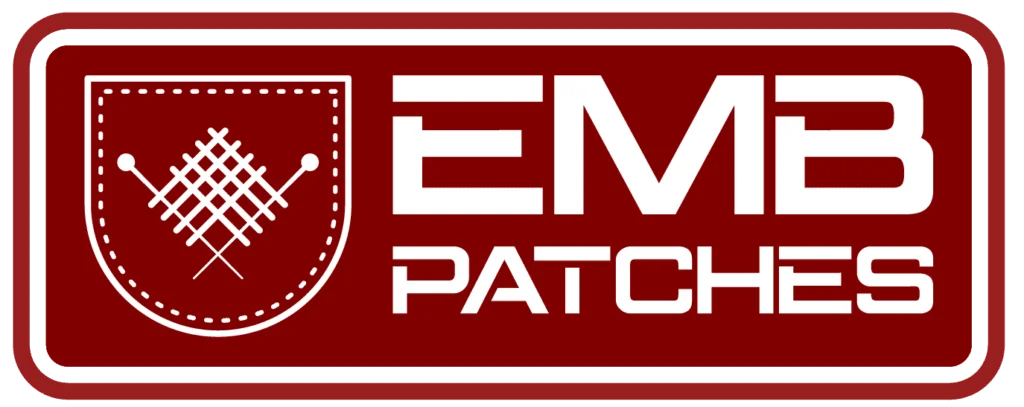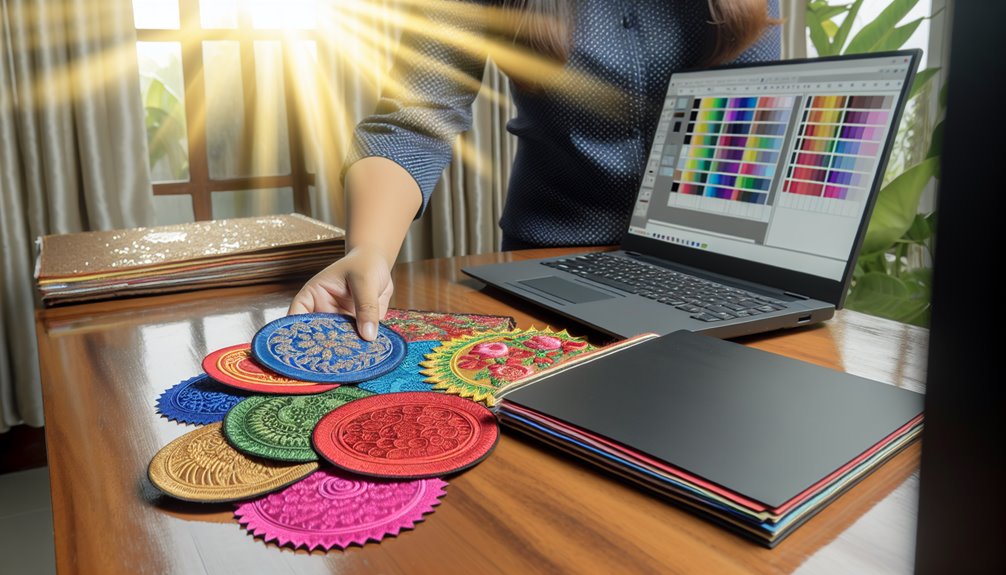Selecting a reputable wholesale embroidery patch supplier requires thoroughly evaluating manufacturing capabilities and sample quality. To guarantee quality and ethical standards compliance, verify industry certifications like ISO 9001 and Oeko-Tex. Research supplier reputation through customer testimonials and online reviews. Assess communication responsiveness and compare pricing structures against minimum order requirements. Examine customization options, delivery timeframes, and return policies. The following criteria will help prevent costly supply chain disruptions and quality issues.
Evaluating Manufacturing Capabilities and Production Capacity
When selecting a wholesale supplier for embroidery patches, businesses must thoroughly assess the manufacturer’s production capabilities and capacity to guarantee they can meet current and future demands.
Companies should request detailed information about the supplier’s production techniques, including their methods for different patch styles and materials. This evaluation should also examine the supplier’s equipment quality, technological sophistication, and workforce expertise.
Capacity planning represents another critical consideration during supplier assessment.
Businesses should inquire about maximum monthly output, typical lead times, and suppliers’ handling of rush orders or seasonal demand fluctuations. Inadequate production capacity could result in delayed shipments, compromised quality, or inability to scale with growing business needs.
Verifying these capabilities early helps prevent potential supply chain disruptions that could damage customer relationships and business reputation.
Assessing Sample Quality Before Bulk Orders
Thoroughly examining physical samples using a structured inspection checklist prevents costly errors and guarantees the final products meet your quality standards.
Manufacturers should demonstrate their ability to match colors precisely to your specifications, including Pantone or custom color requirements.
When evaluating samples, pay close attention to stitch density, edge finishing, backing material quality, and the accuracy of intricate design elements, as these factors directly impact the perceived value of your embroidered patches.
Physical Inspection Checklist
A systematic approach to sample evaluation serves as the essential first defense against potentially costly bulk order mistakes. When examining embroidery patch samples, manufacturers should check thread tension, color accuracy, and edge finishing under proper lighting conditions.
Regardless of supplier location, inspection methods must include both visual assessment and physical testing. Evaluators should verify that colors match approved Pantone codes, stitching maintains uniform density, and backing materials meet durability requirements.
Physical tests should include washing samples according to intended care instructions and checking for color bleeding or thread loosening. Additionally, patches should be checked for accurate dimensions and proper adhesive application if applicable.
These verification steps, when conducted methodically, help businesses avoid quality issues that might otherwise only become apparent after receiving full production runs.
Color Matching Standards
Since color accuracy directly impacts brand integrity, establishing precise color matching standards represents the cornerstone of quality control for embroidery patch production.
Suppliers should demonstrate proficiency in color theory and provide evidence of their color matching capabilities through standardized samples. Businesses should request Pantone color matches and compare them against their brand guidelines before approving production.
When evaluating samples, businesses should examine patches under different lighting conditions, as colors can appear differently under natural light, fluorescent lighting, or LED illumination.
Professional suppliers maintain consistent color palettes across batches and can provide documentation of their color accuracy rates. Insisting on signed color approval forms helps prevent disputes later in production, especially for large orders where color consistency is paramount.
Understanding Minimum Order Requirements and Price Structures
When selecting a wholesale supplier for embroidery patches, businesses must carefully examine minimum order requirements and price structures before agreeing. Minimum order quantities (MOQs) vary considerably between suppliers, affecting both initial investment and inventory management. Effective price negotiation strategies include requesting tiered pricing, comparing multiple quotes, and leveraging long-term commitments.
| Supplier Type | Typical MOQ | Price Range | Lead Time | Quality Level |
|---|---|---|---|---|
| Factory Direct | 500+ | $0.30-0.75 | 3-4 weeks | Variable |
| Domestic Wholesaler | 100-300 | $0.60-1.50 | 1-2 weeks | Consistent |
| Import Broker | 1000+ | $0.25-0.60 | 4-6 weeks | Variable |
| Specialty Vendor | 50-100 | $0.90-2.00 | 1 week | Premium |
| Online Marketplace | 25-100 | $0.75-1.80 | 2-3 weeks | Inconsistent |
Verifying Industry Certifications and Compliance Standards
Responsible suppliers maintain proper industry certifications such as ISO 9001 for quality management or Oeko-Tex for textile safety, which verify adherence to established production standards.
Ethical manufacturing compliance, including SA8000 or WRAP certification, guarantees workers receive fair wages and operate in safe conditions—a critical consideration when selecting overseas patch manufacturers.
Product testing standards like ASTM or CPSIA compliance become especially important for embroidered patches used on children’s items, safety equipment, or products that must meet specific performance requirements.
Quality Certification Types
Verifying industry certifications is essential in selecting a reliable embroidery patch supplier. Quality assurance standards guarantee that manufacturing processes meet benchmarks for global materials and production methods. Buyers should identify certifications that align with their specific product requirements and target markets when evaluating suppliers.
| Certification | Purpose | Industry Relevance |
|---|---|---|
| ISO 9001 | Quality management systems | Guarantees consistent quality procedures |
| OEKO-TEX | Harmful substance testing | Confirms textile safety standards |
| GOTS | Organic textile certification | Verifies sustainable practices |
Understanding the importance of certification helps businesses avoid potential compliance issues when importing or distributing products. Suppliers who maintain multiple certifications typically demonstrate a stronger commitment to quality standards. Buyers should request documentation verifying certification validity, as expired or falsified certifications could indicate problematic business practices. Always cross-reference certification numbers with issuing organizations when possible.
Manufacturing Ethics Compliance
The landscape of manufacturing ethics compliance extends beyond basic quality certifications into critical areas of labor practices, environmental responsibility, and business conduct.
When selecting wholesale embroidery patch suppliers, businesses must verify adherence to international labor standards that prohibit child labor and guarantee fair wages. Reputable suppliers maintain transparent supply chain documentation and willingly share their ethical sourcing policies.
Look for manufacturers who participate in industry ethics programs or hold certifications like WRAP (Worldwide Responsible Accredited Production) or SA8000. These credentials verify that production facilities meet social compliance standards.
Businesses should request documentation of compliance during initial consultations and consider conducting periodic audits of manufacturing facilities. Overlooking ethics compliance can result in serious reputational damage and legal consequences when sourcing embroidery patches from international suppliers.
Testing Standards Matter
Product safety depends heavily on rigorous testing standards when sourcing embroidery patches from wholesale suppliers. Reputable vendors maintain thorough quality assurance programs that verify materials contain no harmful chemicals or dyes, particularly important for patches used on children’s items.
When evaluating suppliers, buyers should request documentation of testing protocols for colorfastness, flame resistance, and lead content. Industry certifications like Oeko-Tex Standard 100 and compliance with the Consumer Product Safety Improvement Act (CPSIA) indicate a supplier’s commitment to safety standards.
These certifications aren’t merely paperwork—they represent systematic testing that protects end users and shields businesses from liability.
Never accept vague assurances about product safety; instead, request specific test reports and certification numbers that can be independently verified through certification databases.
Researching Supplier Reputation and Customer Testimonials
Before committing to any wholesale embroidery patch supplier, savvy business owners must thoroughly investigate their reputation within the industry. Examining supplier feedback from multiple sources provides essential insights into reliability, product quality, and customer service standards.
Online reviews on industry forums, social media groups, and business directories often reveal patterns of satisfaction or concerning issues that may not be apparent from initial communications.
Business owners should look beyond testimonials featured on the supplier’s website, as these naturally present only positive experiences. Instead, seek out third-party verification through trade organizations, request references from current customers, and when possible, order samples before placing large orders.
This all-encompassing approach to vetting helps avoid partnerships with suppliers who may have impressive marketing but deliver substandard products or unreliable service.
Analyzing Communication Responsiveness and Customer Support
While researching potential wholesale suppliers for embroidery patches, business owners must evaluate communication responsiveness and customer support quality, as these factors often predict the overall business relationship.
Suppliers with different communication styles may not align with a company’s operational needs, potentially causing delays and misunderstandings during production.
Three essential factors to evaluate include:
- Response time – suppliers should acknowledge inquiries within 24-48 hours
- Clarity of information – technical specifications and pricing should be presented completely and accurately
- Problem resolution process – how efficiently issues are addressed reveals true customer service quality
Customer feedback from existing clients provides valuable insights into a supplier’s real-world performance.
Businesses should specifically ask about communication consistency during busy periods, as many suppliers maintain excellent support during slow times but falter when production demands increase.
Comparing Customization Options and Design Flexibility
Because the quality of embroidery patches ultimately depends on customization capabilities, business owners should thoroughly assess a supplier’s design flexibility before making commitments.
Reputable suppliers typically offer various personalization options, including different thread types, backing materials, and sizing alternatives. When evaluating potential partners, businesses should request sample books or digital portfolios to examine design aesthetics across different patch styles.
It’s important to reflect on whether suppliers can accommodate complex logos, intricate details, and specialized color matching. Some manufacturers limit customization to protect production efficiency, while others embrace creative challenges.
Businesses should also verify if suppliers provide design assistance services for refining artwork. Additionally, inquire about minimum order requirements for custom designs, as these thresholds often determine whether a supplier can realistically meet your specific business needs.
Examining Delivery Timeframes and Shipping Reliability
Businesses must thoroughly evaluate a supplier’s delivery capabilities when sourcing embroidery patches, as production delays can greatly impact marketing campaigns and merchandise rollouts.
When reviewing potential wholesale partners, companies should examine their track records for on-time delivery and shipping reliability across seasonal fluctuations.
Key factors to take into account include:
- Standard delivery timeframes – Compare quoted production times against industry averages and request testimonials from existing clients.
- Shipping options – Verify availability of expedited services, international shipping capabilities, and associated costs.
- Delivery tracking – Confirm the supplier provides robust tracking systems that allow real-time monitoring of orders.
Understanding these elements helps businesses avoid costly disruptions.
Suppliers offering transparent communication about potential delays and implementing contingency plans demonstrate professionalism that suggests reliability in other operational areas as well.
Reviewing Return Policies and Quality Guarantees
Since defective products can severely damage a company’s reputation and bottom line, thorough examination of a supplier’s return policies and quality guarantees represents a critical step in the wholesale embroidery patch selection process.
When evaluating potential suppliers, businesses should carefully review the return policy documentation, noting specific timeframes for returns and any conditions that might void warranty coverage.
Quality assurance measures implemented by the supplier offer insight into their commitment to consistency.
Reputable wholesalers typically provide detailed information about their quality control procedures and stand behind their products with meaningful guarantees.
Companies should verify whether the supplier offers free replacement of defective items and whether it covers return shipping expenses.
These policies reflect the supplier’s confidence in their merchandise and willingness to maintain customer satisfaction.
Conclusion
While finding a reputable embroidery patch supplier requires thorough research and careful evaluation, the effort invested upfront prevents costly mistakes. Some entrepreneurs worry that rigorous vetting processes delay production timelines, but rushing into partnerships often leads to substandard products that damage brand reputation. By methodically examining manufacturing capabilities, sample quality, and supplier credentials, businesses secure reliable partners who consistently deliver embroidery patches that meet customer expectations.

